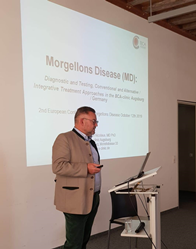“As we celebrate the 30th anniversary of the ADA, we cannot talk about advancements in the inclusion of people of differing abilities, if people of differing abilities are economically disenfranchised and segregated from society through the continued use of 14(c),” DeSantis said in her testimony.
WASHINGTON (PRWEB)
November 25, 2019
Melwood President and CEO Cari DeSantis testified last Friday before the U.S. Commission on Civil Rights about the discriminatory practice outlined in section 14(c) of the Fair Labor Standards Act which allows employers to pay subminimum wages, often around $2.00/hr, to people of differing abilities.
“As we celebrate the 30th anniversary of the ADA, we cannot talk about advancements in the inclusion of people of differing abilities, if people of differing abilities are economically disenfranchised and segregated from society through the continued use of 14(c),” DeSantis said at the briefing. “Service providers across the United States, like Melwood, have an obligation to help correct this injustice by relinquishing their 14(c) status and calling for an end to this discriminatory practice nationwide.”
Today more than 420,000 Americans of differing abilities make less than the minimum wage and are forced to participate in biannual Time Trials, the result of which determines their pay rate. These Time Trials are often criticized because they do not focus on a person as an individual with dignity, but instead only serve to remind employees about their disability and promote unethical wage discrimination. Even those who consistently pass the Time Trials often experience anxiety and shame from being treated differently and watching coworkers fail and suffer decreases in pay.
Melwood, a nonprofit that employs nearly 1,000 people of differing abilities, eliminated all subminimum wages in 2013 and relinquished its 14(c) status in 2016. Melwood, who started the process of transitioning away from 14(c) nearly six years before most other organizations, then went one step further and helped convince the Maryland General Assembly to ban the practice statewide. Today, all of Melwood’s employees of differing abilities earn the same rates as their colleagues of typical abilities for the same work – a rate that is determined by the prevailing wage, time in position, and other policies that apply equally to every Melwood employee.
Friday’s hearing, entitled “Subminimum Wages: Impacts on the Civil Rights of People with Disabilities” was an opportunity for Melwood to join with other disability rights advocates and thought leaders to discuss both the financial and personal impacts of 14(c). At the hearing, DeSantis called for the U.S. Department of Labor to join with states like Alaska, Maryland, Vermont and New Hampshire to abolish the 14(c) certification nationwide.
According to DeSantis, “This bigotry of low expectations foreshadows, and often directly causes, a life of poverty, segregation, and dependency on public support for people of differing abilities. It’s time we realize just how much people of differing abilities are capable of and treat them with the respect and dignity they deserve. It it time for the nation to be on the right side of history.”
To view the live recording of Friday’s briefing, visit the Commission’s YouTube page, at https://www.youtube.com/watch?v=ngfVu1GpC7o&feature=youtu.be.
About Melwood
Melwood is one of the largest employers of people of differing abilities in the country and offers workforce solutions to private businesses and government agencies. Melwood currently employs more than 1,600 workers nearly 1,000 of whom are people of differing abilities – while offering job placement, job training, life skills for independence, and support services to thousands of people each year in DC, Maryland, and Virginia. For more information, visit http://www.melwood.org.
Share article on social media or email:












